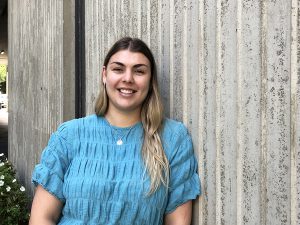What is your position? – I am a New Zealand Registered Dietitian. I hold positions as a Postdoctoral Fellow in the Department of Pediatrics and Child Health at the University of Otago, and as a Research Fellow with Te Hau Kori – The Centre for Physical Activity and Wellbeing at Victoria University of Wellington. I currently serve as a NESI Officer on the Workshop and Webinar Subcommittee and am the Interim Chair of the Early Career Taskforce for the Federation of Oceanic Nutrition Societies (FONS). I am also a Research Partner with Edgar Diabetes and Obesity Research (EDOR) at the University of Otago.
What area of research do you work in? – My current research is focused on the use of advanced technology, such as automated insulin delivery systems, for the management of Type 1 Diabetes. This includes nutritional management such as carbohydrate awareness and nutrition-related impacts of using advanced technologies. Furthermore, my work with Te Hau Kori explores the associations between domain specific physical activity and wellbeing in adults and young people in Aotearoa New Zealand.
My PhD research explored the effects of interrupting sedentary time with short bouts of activity, on postprandial metabolism and sleep, as well as understanding what would help and hinder people from preforming this behaviour in real life. My wider research interests include the importance of physical activity across the lifespan and cardiometabolic disease prevention.
Why is your work important, what drives you to do the work you do, or what brought you to this area of work?
Sport and physical activity have always been a central part of my life. Growing up, I played a range of competitive sports and regularly took part in recreational activities with family and friends. As a result, physical activity is simply part of who I am. I believe it is this passion, along with my personal experiences around both activity and nutrition, that naturally led me to work in this space. Nutrition also played a significant role in my upbringing, particularly in the context of sport, which sparked my interest in nutrition and physical activity as a professional pathway.
I see my work as important because it addresses real-world challenges faced by people living with long-term conditions like Type 1 Diabetes, while also contributing to wider public health outcomes in Aotearoa New Zealand. Whether it’s supporting individuals to make the most of advanced technologies for better diabetes management, or exploring how physical activity across different life domains relates to wellbeing, I’m driven by the opportunity to contribute to evidence-based strategies that make a meaningful difference in people’s lives.
What excites you most about your colleagues from around the world visiting NZ? – I’m really looking forward to the opportunity to connect in person with colleagues from around the world, especially those I’ve only ever interacted with online. It’s exciting to be able to showcase the research happening here in Aotearoa New Zealand, and to learn from the diverse perspectives that international visitors bring. There is always something special about welcoming others to our home country, sharing our culture, and building new collaborations in a uniquely New Zealand context. Importantly, I think having the conference here provides a valuable platform for amplifying voices from the Pacific region, that are often underrepresented on the global stage.
Do you have any recommendations for Auckland (or NZ in general) for folks coming into town? – Wynyard Quarter is definitely worth a visit on a nice day (on the waterfront in Auckland City). If you want to go North of the City, I recommend checking out Takapuna Beach, it’s perfect for a beach day, and there are plenty of great shops and eateries close by. If you’re after more of a laid-back, relaxed vibe, I’d recommend heading up to the Hibiscus Coast or Orewa – that part of Auckland has beautiful beaches and a real holiday feel, without having to venture too far. There are also loads of great walks around Auckland itself, like Rangitoto Island (you’ll need to take a ferry there), Mount Eden, or the bush tracks out in the Waitākere Ranges.
Why is NZ a unique place to do research? – From my experiences, I would say we have a strong culture of interdisciplinary collaboration, and a real drive to ensure that research makes a tangible difference in people’s lives. Being a smaller country means we’re often able to work more closely with communities, clinicians, and policymakers, which helps ensure our research is not only rigorous but also relevant and impactful. On the other hand, being a smaller country also means that collaboration is central to the work we. Building strong relationships across institutions, sectors, and disciplines is essential to maximise resources and create meaningful change and is something that has been evident to me right from the beginning of my research career.


